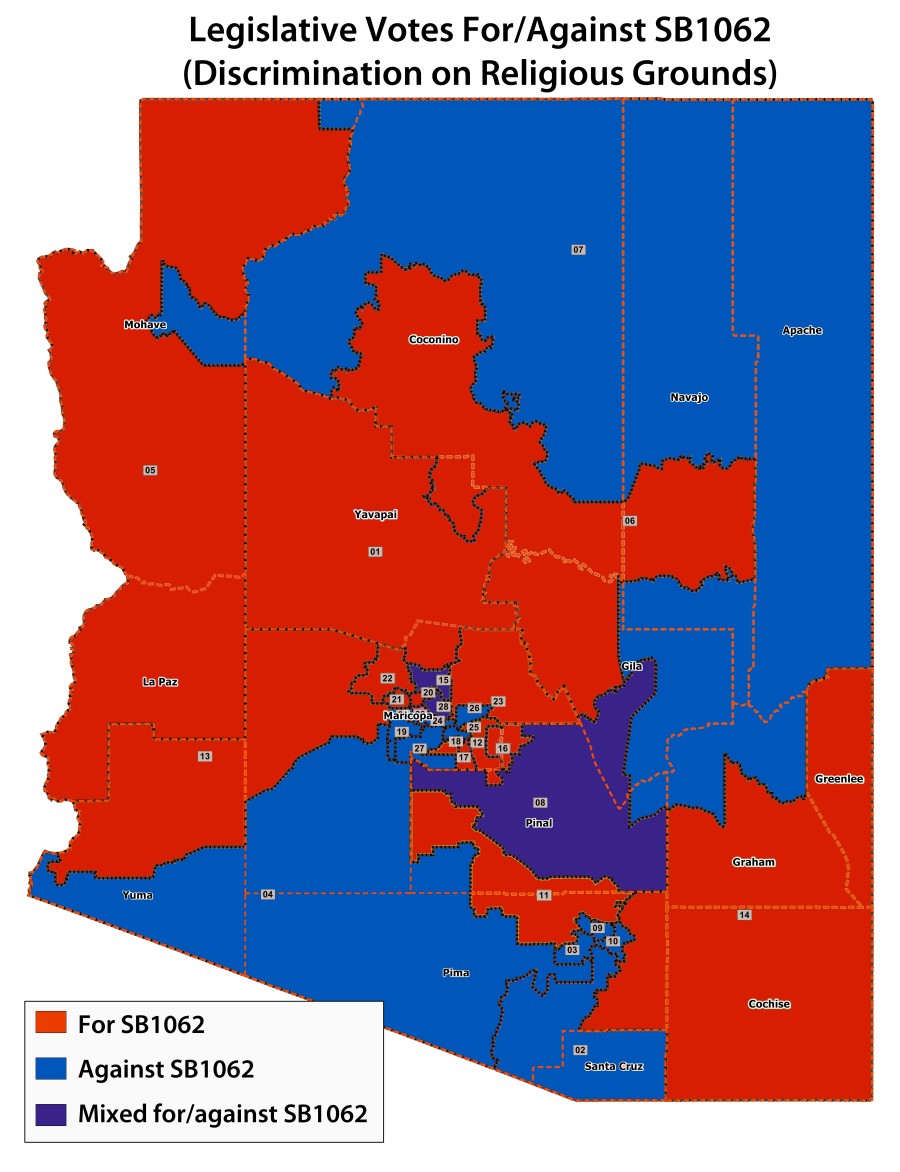By now we’re all familiar with SB1062, the tremendously controversial bill that sanctifies discrimination as a valid expression of religious belief. For those interested, here’s the text of the bill, and here are the laws that are currently on the books that it will replace (41-1493 and 41-1493.01). Unfortunately, because of the idiosyncratic way legislative districts are split up in Arizona, it’s tough to know who voted for or against this bill. I’m here to lay it out for you as simply as possible. Links are to email the representative directly. This information was all gleaned from LegiScan and the Arizona Legislator’s own website.
I’ve given short descriptions of the districts as of the 2010 Arizona redistricting, using this map. But I’m not too familiar with the Phoenix area, so I would graciously accept any corrections in the comments and incorporate them into this post.
Legislators in Favor of SB1062
District 1 (Prescott and surrounding areas) – (R) Sen. Steve Pierce, (R) Rep. Karen Fann, (R) Rep. Andy Tobin
District 5 (Western Arizona, Kingman, Quartzsite, Blythe) – (R) Sen. Kelli Ward, (R) Rep. Sonny Borrelli, (R) Rep. Doris Goodale
District 6 (Mountainous Arizona, Flagstaff, Sedona, Payson, Heber-Overgaard, Snowflake) – (R) Sen. Chester Crandell, (R) Rep. Brenda Barton, (R) Rep. Bob Thorpe
District 8 (Area between Tucson and Phoenix north of I-10, Globe, Florence, Coolidge, Oracle, Casa Grande) – (R) Rep. Frank Pratt, (R) Rep. T.J. Shope
District 11 (Area between Tucson and Phoenix south of I-10, Marana, Catalina, Saddlebrooke, Oro Valley, Maricopa) – (R) Sen. Al Melvin, (R) Rep. Adam Kwasman, (R) Rep. Steve Smith
District 12 (Gilbert) – (R) Sen. Andy Biggs, (R) Rep. Warren Petersen, (R) Rep. Eddie Farnsworth
District 13 (West Phoenix, Yuma, Wickenberg) – (R) Sen. Don Shooter, (R) Rep. Steve Montenegro, (R) Rep. Darin Mitchell
District 14 (Southeast Arizona, Vail, Benson, Sierra Vista, Bisbee, Douglas, Safford, Wilcox, Pearce) – (R) Sen. Gail Griffin, (R) Rep. David M. Gowan Sr., (R) Rep. David W. Stevens
District 15 (Far North Phoenix) – (R) Sen. Nancy Barto*, (R) Rep. John Allen
District 16 (Apache Junction) – (R) Sen. David Farnsworth, (R) Rep. Kelly Townsend, (R) Rep. Doug Coleman
District 17 (Chandler) – (R) Sen. Steve Yarbrough*, (R) Rep. Thomas Forese, (R) Rep. Javan “J.D.” Mesnard
District 18 (South Phoenix, Ahwatukee Foothills) – (R) Sen. John McComish, (R) Rep. Jeff Dial, (R) Rep. Bob Robson
District 20 (Phoenix, North Mountain) – (R) Sen. Kimberly Yee, (R) Rep. Paul Boyer, (R) Rep. Carl Seel
District 21 (Peoria) – (R) Sen. Rick Murphy, (R) Rep. Rick Gray, (R) Rep. Debbie Lesko
District 22 (Surprise, Sun City West) – (R) Sen. Judy Burges, (R) Rep. Phil Lovas, (R) Rep. David Livingston
District 23 (Scottsdale, North Scottsdale) – (R) Sen. Michele Reagan, (R) Rep. John Kavanagh, (R) Rep. Michelle Ugenti
District 25 (Northeast Mesa) – (R) Sen. Bob Worsley*, (R) Rep. Justin Olson, (R) Rep. Justin Pierce
District 28 (North Mountain, Paradise Valley) – (R) Sen. Adam Driggs
*Bill sponsor or Cosponsor
Legislators Against of SB1062
District 2 (Nogales, Sahuarita, Green Valley, South Tucson) – (D) Sen. Andrea Dalessandro, (D) Rep. Rosanna Gabaldón, (D) Rep. Demion Clinco
District 3 (West Tucson) – (D) Sen. Olivia Cajero Bedford, (D) Rep. Sally Ann Gonzales, (D) Rep. Macario Saldate IV
District 4 (Southwest Arizona, Ajo, Three Points, Somerton) – (D) Sen. Lynne Pancrazi, (D) Rep. Juan Carlos Escamilla, (D) Rep. Lisa Otondo
District 7 (Northeast Arizona Mountains and Plateau, Show Low, Pinetop-Lakeside, Springerville, St. Johns) – (D) Sen. Carlyle Begay, (D) Rep. Jamescita Peshlakai, (D) Rep. Albert Hale
District 8 (Area between Tucson and Phoenix north of I-10, Globe, Florence, Coolidge, Oracle, Casa Grande) – (D) Sen. Barbara Mcguire
District 9 (North Tucson, Catalina Foothills, Casas Adobes) – (D) Sen. Steve Farley, (R) Rep. Ethan Orr, (D) Rep. Victoria Steele
District 10 (East Tucson, Tanque Verde) – (D) Sen. David Bradley, (D) Rep. Stefanie Mach, (D) Rep. Bruce Wheeler
District 15 (Far North Phoenix) – (R) Rep. Heather Carter
District 19 (West Phoenix, Estrella Village) – (D) Sen. Anna Tovar, (D) Rep. Lupe Chavira Contreras, (D) Rep. Mark A. Cardenas
District 24 (Encanto Village, Camelback East) – (D) Sen. Katie Hobbs, (D) Rep. Chad Campbell, (D) Rep. Lela Alston
District 26 (Tempe, Mesa) – (D) Sen. Ed Ableser, (D) Rep. Andrew Sherwood, (D) Rep. Juan Mendez
District 27 (Central Phoenix, South Mountain Village, Laveen Village) – (D) Sen. Leah Landrum Taylor, (D) Rep. Ruben Gallego, (D) Rep. Catherine H. Miranda
District 28 (North Mountain, Paradise Valley) – (R) Rep. Kate Brophy McGee, (D) Rep. Eric Meyer
District 29 (West Glendale) – (D) Sen. Steve Gallardo, (D) Rep. Martín J. Quezada, (D) Rep. Lydia Hernández
District 30 (East Glendale) – (D) Sen. Robert Meza, (D) Rep. Jonathan Larkin, (D) Rep. Debbie McCune Davis
Key points
This bill was split quite clearly across party lines, with no democrats in favor of SB1062 and only 3 republicans against the bill (District 9 Ethan Orr from North Tucson, District 15 Heather Carter from north of Phoenix, District 28 Kate Brophy McGee from North Mountain/Paradise Valley Phoenix). Legislative districts were not very split on the issue, with only 3 districts having any division between legislators (Districts 8 between Tucson and Phoenix, District 15 north of Phoenix, District 28 North Mountain/Paradise Valley). In general, Tucson was against the bill, rural Arizona was in favor of the bill, and the Phoenix metropolitan area split between its constituent divisions and neighborhoods.
Ongoing developments
2/24/14 – Bill cosponsor (R) Sen. Bill Worsley, as well as (R) Sen. Steve Pierce and (R) Sen. Adam Driggs have pulled support for this bill, publicly requesting Gov. Brewer to veto it. News story here. If they had changed their votes earlier, the bill would have lost in the senate 14-16.

